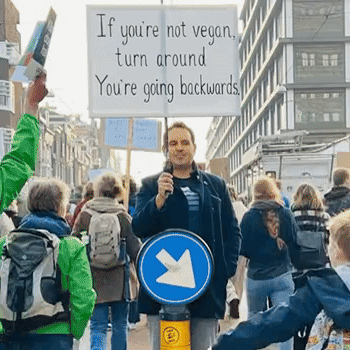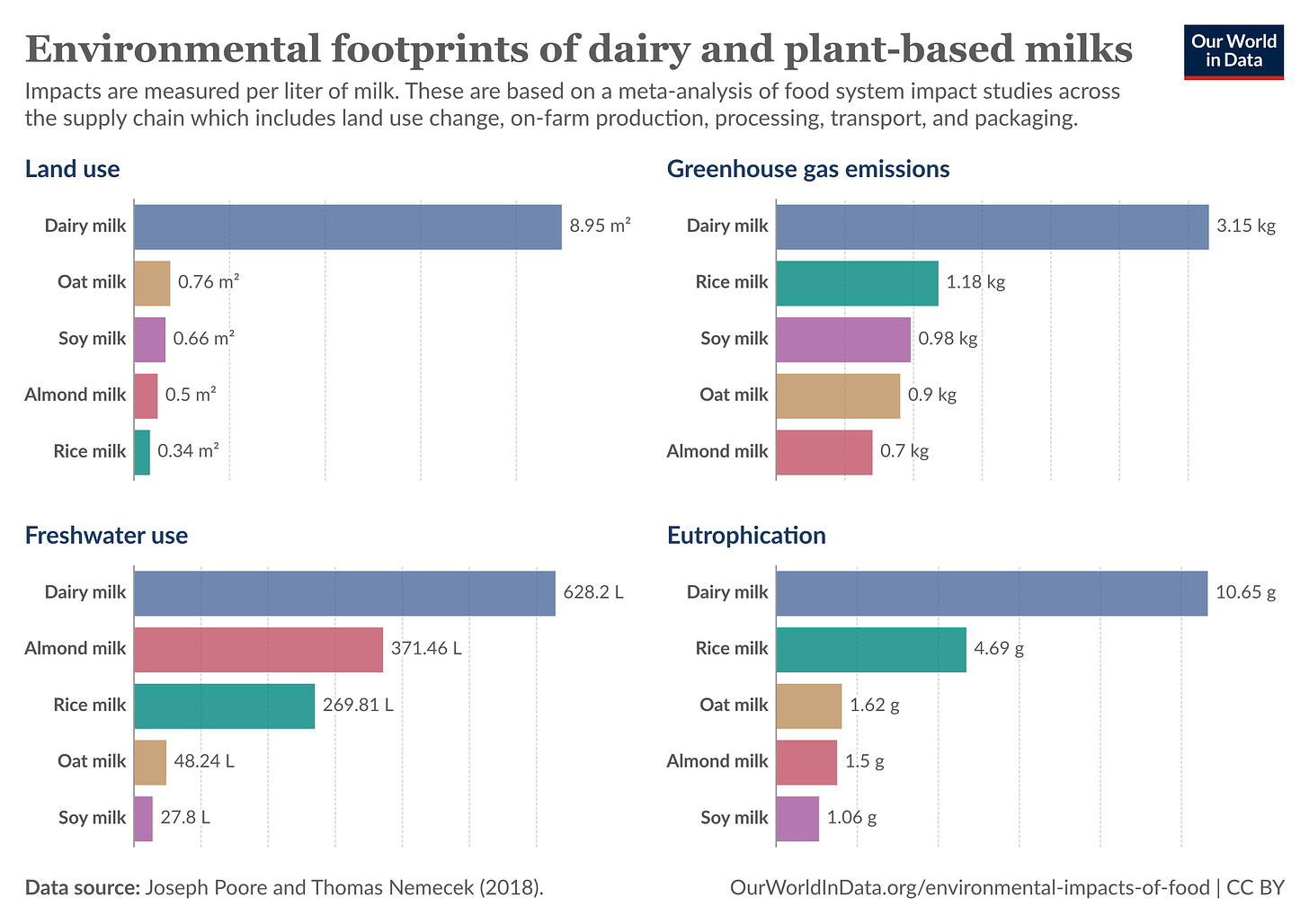Environmentalist and Not Vegan? Are You Joking?
Seriously, there are some things we need to talk about.
It’s no secret that animal agriculture is a leading cause of environmental destruction. This is not vegan propaganda. This is what science has been telling us for years.
Already two decades ago, the United Nations published a report titled “Livestock’s Long Shadow” with the following conclusion:
“The livestock sector emerges as one of the top two or three most significant contributors to the most serious environmental problems, at every scale from local to global.”
Advocating for environmental protection but continuing to buy animal products is more than hypocritical — it is self-sabotage.
In fact, avoiding meat and dairy has been recognized by experts as the “single biggest way” to reduce your impact on Earth.
Why is livestock farming an environmental nightmare?
The short answer is: Animals are an incredibly wasteful and inefficient food source.
The environmental impact of animal agriculture is a well-documented catastrophe. Tons of scientific articles, books, and documentaries offer a more detailed account.
For today, let’s focus on some key facts and figures:
Greenhouse gas emissions:
Livestock farming is among the leading drivers of climate change, producing more than five times the greenhouse gas emissions of all aircraft in the world taken together. Researchers found that vegan diets result in 75% less climate-heating emissions than meat-rich ones.Water pollution:
The global food system causes 80% of river and lake pollution — mostly due to toxins and waste from animal agriculture. On average, meat-rich diets produce four times as much water pollution as vegan diets.
Deforestation:
Animal agriculture is by far the biggest cause of deforestation globally. Meat production alone drives deforestation five times more than any other sector, and is responsible for 80% of Amazon rainforest destruction.
Soil degradation:
Over-grazing of livestock has been a significant cause of soil degradation. In the U.S., for instance, the meat industry is directly responsible for 85% of all soil erosion.Land use:
Animal agriculture is by far the biggest source of human land use, taking up an area around four times the size of the United States. The industry provides just 18% of calories but takes up 83% of farmland. A global shift to a plant-based diet would free up 75% of the land currently used for agriculture, providing vast space for ecosystem restoration, renewable energy, and reforestation.
And that’s far from all …
In addition to the environmental harms listed above, the livestock industry is also a leading cause of air pollution, overfishing, ocean dead zones, acid rain, water shortage, and loss of biodiversity around the world.
When studying the vast array of damages caused by animal agriculture, one thing becomes crystal clear: To effectively combat climate change and environmental destruction, phasing out livestock production is not merely an option — it is an imperative.
Can we really fight climate change with diet change?
Yes, we can. Here is what leading experts say:
“Shifts in global food production to plant-based diets by 2050 could lead to sequestration of (…) 99–163% of the CO2 emissions budget consistent with a 66% chance of limiting warming to 1.5 °C” (Hayek et al., 2021)
In simpler terms: A shift towards plant-based diets has a huge potential in mitigating catastrophic global warming. There are good reasons why climate activists like Greta Thunberg strongly advocate for a vegan lifestyle.
“If you’re not vegan, turn around. You’re going backwards.”
Last year, a man went to a climate march in Amsterdam to hold this sign for two hours until all 85,000 people passed him:

The phrase “going backwards” hits the nail on the head. Often, people cause more harm through their consumption of animal products than they do good with their environmental activism. In this time of urgent environmental crises, we simply cannot afford such contradictions.
Anti-climate lobbying by the livestock industry
Powerful players in animal agriculture spend millions to block climate action and policy. The Guardian recently reported how meat and dairy lobbyists turned out in record numbers at the world’s biggest climate summit in 2023 (three times as many delegates as in the previous year).
In their efforts to cover up the damages they cause to climate and environment, meat and dairy companies are “borrowing Big Oil’s playbook”. They also reportedly pressured a UN body to censor work on livestock farming methane emissions, which have 84 times greater global warming potential than carbon dioxide on a 20-year timescale.
Isn’t vegetarian enough?
If we want to have a realistic chance of protecting climate, environment, and human survival on this planet, being vegetarian is not enough.
As The Guardian reports, greenhouse gas emissions from just 13 dairy firms match those of the entire UK. When compared with plant-based alternatives, cow’s milk has by far the biggest environmental footprint. Oat milk, for instance, uses around 92% less land and freshwater, causes 85% less eutrophication, and produces 70% less greenhouse gas emissions than cow’s milk.
Even the “worst” plant-based alternatives, such as almond and rice milk, are still far better for the environment than dairy milk. Cheese often even exceeds the environmental impacts of meat production.
Aren’t corporations the real culprits?
It may be tempting to absolve yourself of responsibility and expect those “up there” — politicians and large corporations — to solve our problems. But it won’t work like that.
Companies are supplying animal products because people are buying them.
If we don’t alter our consumption habits, companies won’t change. If we don’t build public pressure, politics won’t change. There is not the slightest doubt: Without us getting active and making personal changes, those “up there” will neither be willing nor able to save us.
The many ugly sides of the livestock sector
The environmental impacts outlined above are more than reason enough to ditch animal products once and for all. However, let’s not forget that they are only one of many ways in which the industry causes harm to us and other inhabitants of this planet.
Besides fueling climate change and environmental devastation, the industry is also a nightmare for livestock animals, exploited workers, public health, indigenous people, and the world’s starving. Even if you ignore all environmental impacts, the industry would still remain the world’s biggest source of suffering.
At least be honest with yourself
Even if we phase out fossil fuel emissions completely, we will still face a climate catastrophe if we keep eating animals.
If you actually care about climate and environmental protection, please at least be honest with yourself. By betraying your own values, you’re not doing anyone a favor. As Grant Lingel aptly puts it:
“If you are an environmentalist and consume meat, dairy, or eggs, you are a hypocrite. I’m not saying this to attack you. I am not saying this because I am a mean person. I am simply calling a spade a spade.”
Nobody needs animal products to be healthy. In fact, population studies have shown that we are healthier without. There is literally nothing that keeps you from aligning your words and deeds.
A vegan lifestyle not only avoids unnecessary violence against animals, prevents many forms of environmental destruction, is vital for tackling climate change, and improves your own health, but also protects your fellow human beings from hunger, misery and exploitation.
Honestly, can you think of a more convincing reason to try out a new diet and lifestyle?
Don’t wait any longer — make the switch today.







“Companies are supplying animal products because people are buying them.” EXACTLY!
And the reason people are buying them is due to the multi-pronged mis- and dis-information propaganda machine of big business.
Put simply, and completely selfishly about this - going vegan will make you healthier!
BUT - going vegan will also let you “stick it to the man”.
Vegan’s have the power to weaken Big-Pharma, Big-Ag, Big-Health.
Big-Food will adapt to whatever dietary patterns we adapt, so we’re probably stuck with them. But this could actually be a surprising good outcome? Once Big-Food sees growing demand for vegan food they will make it, and in turn reduce the production of animal products.
Going vegan has so many up-sides it is easy to understand why vegans are attacked by the mainstream media (Big-Media) in cahoots with all the Bigs above.
Wonderful contribution to the Vegan argument.